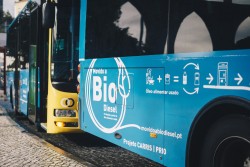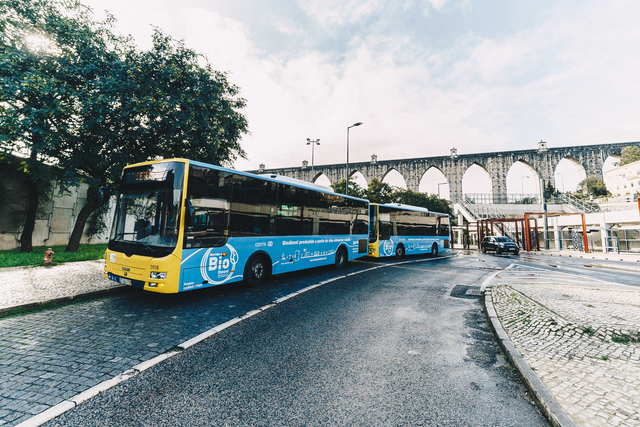Road Transportation is responsible for nearly 25% of direct CO2 emissions in Europe. Road vehicles – cars, trucks, buses and two- and three-wheelers – account for a considerable portion of this value.
That is why PRIO, as a leading advanced fuels and biofuels operator in Portugal, and Carris, one of the most important urban fleets operators, decided that it was time to act on this problem and test sustainable solutions for conventional diesel engines.
With PRIO’s ZERO Diesel, both companies were able to transform 6 conventional buses in 100% renewable and fossil-free means of transportation without changing anything besides the fuel used, proving that is possible to act on climate change and start the energy transition right here and now, with the vehicles of today.
Description of the project
The Powered by Biodiesel project is a joint initiative between PRIO and Carris for the use of 100% advanced biodiesel in the 702 - Serafina - Marquis of Pombal bus line. The project aims to promote sustainable mobility in city centres through alternative energy sources, such as biodiesel while raising awareness for the importance of recycling used cooking oils, that can have a second life as raw material for fuel for mobility.
Project goals
- Promote circular economy and sustainable mobility in urban settings
- Create conditions for the use of sustainable energy solutions in diesel vehicles
- Prove technical feasibility of deploying biodiesel
- Establish the first Portuguese city bus line powered by biodiesel
- Enhance the sustainability of public transport without the need for investment in new vehicles
- Raise awareness for the importance of recycling used cooking oils
Technology used
The technology associated with the project is the biodiesel process technology installed in PRIO’s biodiesel plant. This technology allows for optimal production of biodiesel from residual raw materials with a very low percentage of rapeseed or soy virgin oils, with greater efficiencies and lower costs, thus resulting in waste-based, advanced biodiesel that meets the European biodiesel standard (EN 14214).
On the buses’ side, there’s no new technology associated. They are the same diesel buses that have been on the road in the latter years, transporting thousands of Carris’s commuters.
Implementation
The pilot was born out of a match between Carris’ challenge to decarbonize their fleet, on one side, and PRIO’s will to promote biodiesel as a feasible alternative to diesel, on the other.
In recent years, Carris has made an effort to renew its fleet with new, more sustainable vehicles, such as electric and vehicular natural gas buses. But this fleet operator has hundreds of regular diesel buses which impose a challenge to Carris’ decarbonization efforts. PRIO has been introducing fuels with higher blends of biodiesel and ZERO Diesel (B100) in the market as feasible replacements of regular fuel.
It was this convergent path that allowed for the implementation of the project in two phases:
- Demonstration phase until mid-2019
During the first phase, ZERO Diesel was used in 3 buses of the 702-bus line and both the operational and maintenance teams from Carris monitored up close the fuel’s performance.
- Commercial pilot phase until mid-2020
In this phase, ZERO Diesel was used in all buses operating bus line 702 and there was a formal launch of the pilot project to the public.
Impact
The use of ZERO Diesel reduces the greenhouse gas emissions of traditional fossil fuels by 84% while also recycling and valuing a residue that has no alternative use and saving the world’s waters from this very pollutant material.
For Carris, using ZERO Diesel meant an immediate replacement of the use of fossil fuels with no extra capital cost, as the buses are the same and needed no adaptations.
Challenges / Lessons learned
There are still some concerns and misconceptions regarding biodiesel use. These misconceptions were a challenge with Carris’ operational teams in the beginning. This challenge was quickly overcome, as the team realized that there were no perceivable changes in bus performance, nor the use of biodiesel affected the regular maintenance procedures.
Long term strategy
PRIO and Carris are looking into the possibility of extending the use of ZERO Diesel to other bus lines.
The main strategy for PRIO is to continue promoting ZERO Diesel and other fuels with higher biofuel blends in coordination with clients, municipalities and vehicle OEMs. The latter may prove to have a key role in eliminating wrong preconceptions regarding biodiesel use.
An additional important step is making biodiesel seen as a solution for energy transition and climate action in Portugal. Other solutions such as electric vehicles and hydrogen are broadly seen as the only available options and PRIO and its partners want to show to the government and to fleet operators that this is not necessarily true. With the right support and incentives, biodiesel can prove itself to be the most feasible solution for energy transition on the short to medium term, both technically and economically.




